- The GCC is actively adopting digitalization through projects, such as the Unified GCC Tourist Visa and Saudi Arabian Vision 2030, making the region a technological leader in the world of innovative touring experiences.
- Travel apps are becoming customized, 3D-based, backed with real-time features like AI-based suggestions, AR/VR experiences, and real-time updates.
- To maintain a smooth, safe transaction and optimal performance during peak seasons of the year, businesses need to focus on compliance and scalability while developing a robust travel app.
The GCC is turning into one of the hottest travel spots worldwide. From Saudi Arabia’s desert landscapes to Dubai and Doha’s impressive skylines, people want travel experiences that work smoothly and feel personal. As more people rely on their smartphones for trip planning, there is a rising demand for mobile apps that simplify booking, planning, and discovering local attractions.
With tourism in the region getting bigger all the time, creating a next-generation travel app means doing more than just throwing in fancy tech. Companies must understand the cultural nuances of the GCC, comprehend how regional payments work, and develop apps that are intuitive and natural for Arabic speakers to use.
With a revenue of $4.80bn by 2030, the travel & tourism market of the MENA region is poised for significant growth (Source: Statista). As smartphones turn into the main tool people use for travel tasks, businesses that serve these needs can give travelers a smooth, secure, and worthwhile experience. When companies get this right, they become the first choice for travelers throughout the GCC region.
Bottom line, creating a travel app in the GCC takes more than just knowing the tech side of things. You really need to understand what locals want and how they like things done. Companies that figure this out will benefit big time from getting into one of the world’s fastest-growing travel markets.
In this blog, we will explore the role of travel app development in GCC, the steps to build one, its core and advanced features, cost estimates, and key challenges. Let’s take a closer look.
Turn 40 Million Guests into Opportunities
Develop enterprise-grade travel apps that drive growth while aligning with the UAE’s Tourism Strategy 2040
The Digital Travel Revolution in the GCC
The Gulf Cooperation Council (GCC), comprising Bahrain, Kuwait, Oman, Qatar, Saudi Arabia, and the UAE, is rapidly transforming the travel and tourism industry through digital advancements. Governments across these countries have promised to go digital as part of their big long-term plans, like Saudi Arabia’s Vision 2030 and the UAE’s Tourism Strategy 2040.
These programs focus on creating travel experiences that work seamlessly with technology, including the new Unified GCC Tourist Visa, which allows people to visit all six countries with just one permit, making border crossings significantly simpler. You can apply for the visa completely online, which matches the GCC’s bigger goal to make tourism operations digital.
The UAE’s partnership with UN Tourism to create a digital platform that helps member countries communicate better also shows how committed the region is to updating tourism using technology. This environment creates perfect opportunities for custom travel app development UAE and enterprise travel app solutions in the GCC that can take advantage of these digital changes.
Local enterprises are also playing a crucial role in the region’s digital changes, with more than 150 travel-related startups in the UAE alone creating new mobile solutions. These startups help build the GCC’s busy travel ecosystem by making specialized apps that work for different kinds of travelers, from booking systems to personal trip planning.
The region’s focus on the implementation of AI-powered technologies in travel and tourism industry, mobile-first solutions, and smooth connection of local services is changing how people experience travel. As the GCC continues to invest in these digital projects, it’s creating new benchmarks for travel app digitization, providing travelers with more personalized, efficient, and secure travel experiences throughout the region.
Step-by-Step Travel App Development Process in GCC
Creating a travel application within the GCC requires a systematic approach. Throughout the early research and design, development, testing, and launch of the app, every moment is geared towards ensuring that the app meets the expectations of the region and provides a seamless user experience. The step-by-step process would also minimise the cost, prevent mistakes, and develop the platform that would really appeal to GCC travellers.
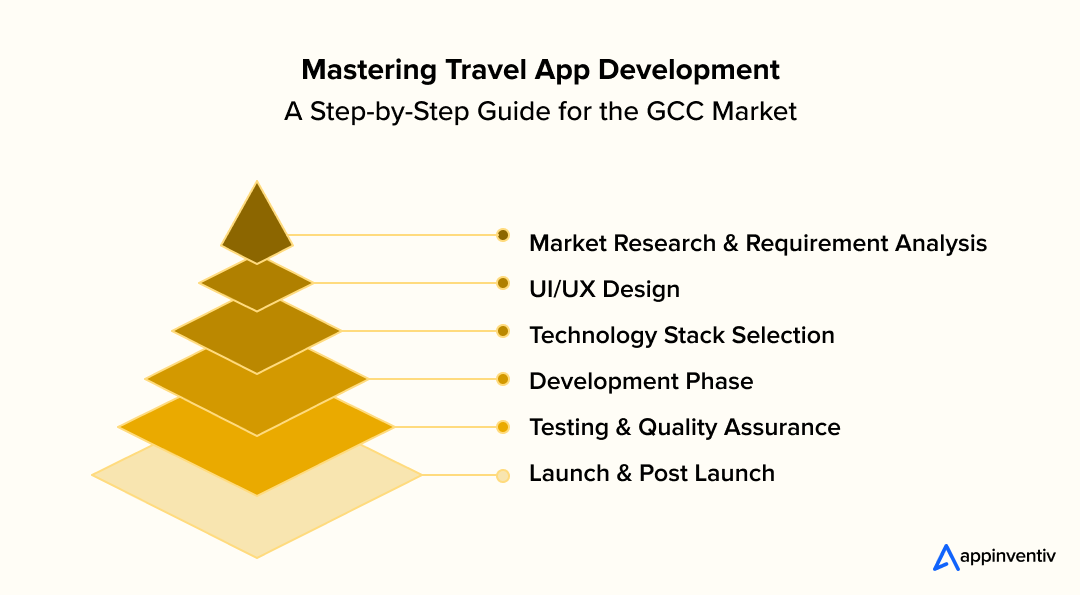
Market Research & Requirement Analysis
When you’re getting ready to start travel app development in GCC, the first thing you should do is really understand your market. Take time to see what other apps are out there and figure out what they’re missing. Build profiles of the people who will actually use your app so you know what GCC travelers care about most.
You also need to check out the local laws, see how people like to pay for things, and understand what users in this region expect. Writing everything down clearly now will make the whole development journey much smoother.
UI/UX Design
Getting the design right is huge when you’re figuring out how to build a travel app in GCC. Your UI/UX design team should sketch out the basic structure first, then build working models so everyone can see how it will actually function.
Add design elements that feel right for the region, let people use it in their own language, and make it work for everyone. When you spend time getting the design perfect early on, your users will be happy and want to keep using what you built.
Technology Stack Selection
Picking the right AI-backed tech stack matters a lot for enterprise travel app development Dubai and across the GCC region. You can build the frontend with Flutter, React Native, Swift, or Kotlin, depending on which platforms you want to target.
For the backend, consider Node.js or .NET paired with cloud hosting so your app can handle growth. Connecting local payment wallets like Rakuten Pay and STC with travel service APIs will enable users to book smoothly and receive updates promptly.
Development Phase
The actual building process is conducted using agile methods, with regular sprints and ongoing testing to maintain high quality. Your team will connect outside services like booking systems, maps, and review sites during this time.
This part is really important for custom travel app development UAE because you need to make sure the app works exactly how local travelers expect it to. Regular check-ins between your developers, designers, and product managers help everyone stay focused on what the business needs to accomplish.
Testing & Quality Assurance
Comprehensive testing guarantees your app functions properly across all device types. Performance evaluation, security assessment, and cross-platform validation are necessary to achieve professional standards.
The QA team identifies issues and resolves them before launch to prevent user complaints later. This phase also includes verification of GCC regulatory compliance and data protection requirements. Thorough quality assurance delivers a reliable application that travelers can depend on.
Launch & Post Launch
The launch process includes beta user testing and app store optimization to maximize discoverability. Ongoing monitoring of user interactions and feedback enables regular feature updates and performance improvements.
Post-launch maintenance is essential because travel preferences evolve, and maintaining market relevance is crucial. A properly executed travel app development process creates lasting value and sustained user engagement throughout the GCC market.
Must-Have Features for GCC Travel Apps
A GCC market travel application next-gen is not about booking. It takes a combination of personalization, convenience, and compliance to satisfy the demands of both local and international tourists. The features that must be in place are:
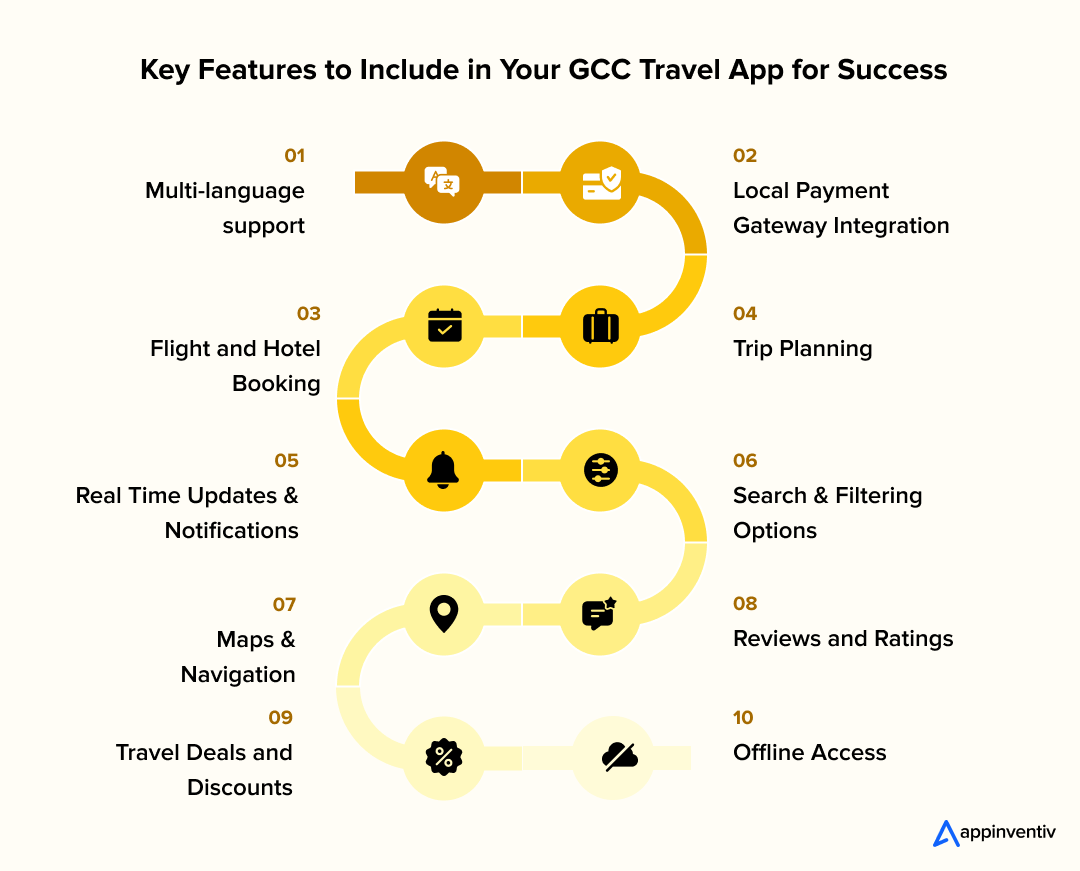
- Multi-language support: The multi-language travel apps (Arabic + English) work with both languages, so that the residents, expats, and tourists can use them easily.
- Local Payment Gateway Integration: Connects smoothly with GCC payment methods like Mada, PayTabs, and credit/debit cards, so transactions stay easy and safe.
- Flight and Hotel Booking: Users can search, compare, and book flights and places to stay in real time, getting confirmations right away.
- Trip Planning: Let’s travelers organize trips, keep track of bookings, and check schedules all in one spot.
- Real Time Updates & Notifications: Tells users about flight delays, hotel confirmations, gate changes, or tour schedule changes immediately.
- Search & Filtering Options: Good filters for flights, hotels, and tours help users find what works best for them fast.
- Maps & Navigation: Built-in maps and GPS help travelers get around destinations without getting lost.
- Reviews and Ratings: Reviews and ratings from other users for hotels, airlines, and activities help people make better choices and feel more confident.
- Travel Deals and Discounts: Special offers, promo codes, and seasonal deals get people to book more and keep them interested.
- Offline Access: Access trip plans, tickets, and maps even when there’s no internet, which really helps international travelers.
Advanced Functionalities of a GCC-based Travel App
Advanced features improve the user experience and make your app stand out in the competitive GCC travel market.
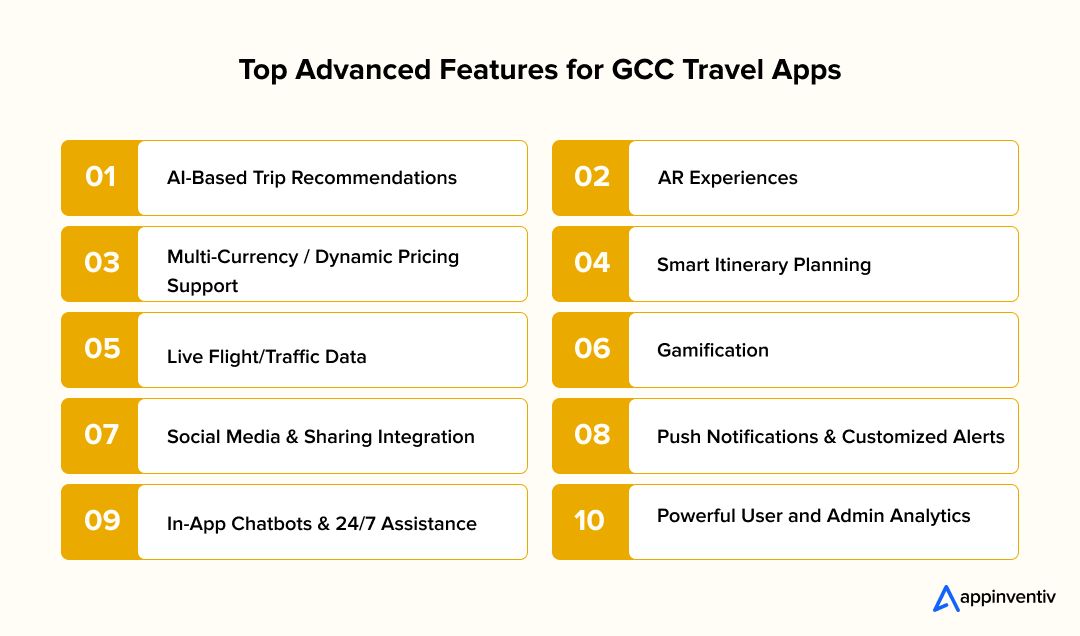
AI-Based Trip Recommendations: Individualized travel recommendations depending on the user needs, past purchases, and search history improve interaction and satisfaction.
AR Experiences: AR tools enable users to view landmarks, hotels, or attractions in 3D prior to visiting, which can be considered an element of immersion.
Multi-Currency / Dynamic Pricing Support: Shows the prices in local currency (AED, SAR, etc.) and is dynamically adjusted to the seasonal demand or special offers.
Smart Itinerary Planning: Recommends the best paths to travel, activities and time management automatically to enhance the trip experience.
Live Flight/Traffic Data: Offers real-time flight monitoring, gate reassignments, traffic notices and alternative routes to help avoid delays.
Gamification: Rewards, points, or badges within the app make it easier to use the product regularly and will raise customer loyalty.
Social Media & Sharing Integration: Gives users the option to post itineraries, reviews, and travel experiences on social sites in the app itself.
Push Notifications & Customized Alerts: Individual offers, travel notices, or booking updates keep customers updated and interested.
In-App Chatbots & 24/7 Assistance: AI chat support solves questions in a short time, and multilingual support makes it accessible throughout the GCC region.
Powerful User and Admin Analytics: Offers information about trends in travel, user behavior, and performance of the app to assist in optimizing offerings and marketing practices.
Understanding the Cost of Developing a Travel App in GCC
Estimating the cost of developing a travel app in the GCC depends on features, platform choice, and post-launch maintenance. Let’s have a detailed look at the key factors affecting overall costs, explore the estimated costing range in a comprehensive table, review the types of travel mobile apps with their price ranges, and examine smart ways to reduce travel app development costs in the GCC.
Key Factors That Determine Travel App Development Costs
The cost of a travel app construction in the GCC is dependent on several factors. These are feature and design complexity, backend infrastructure, third-party interface, and integrations. Knowing these factors will assist businesses in budgeting. Let’s understand those.
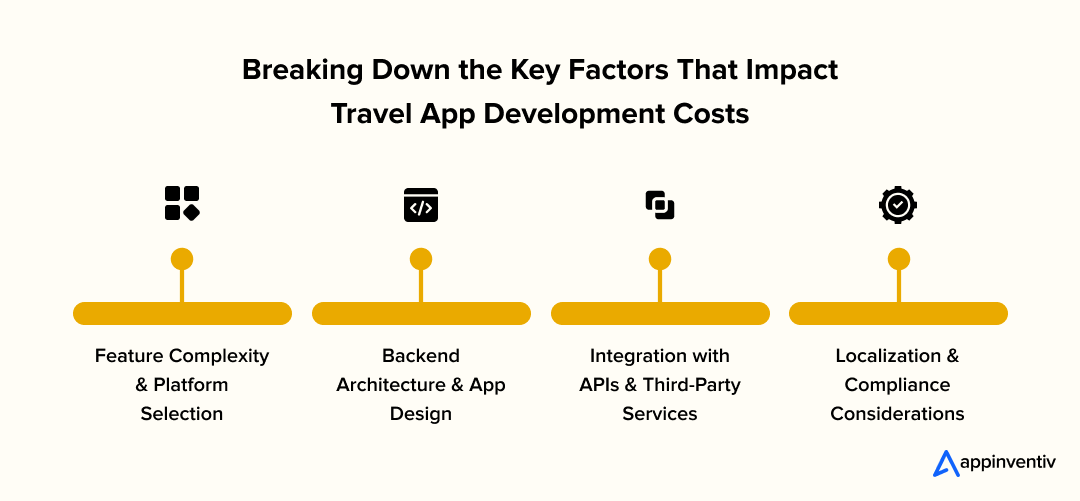
Feature Complexity and Platform Selection
The travel app development cost in GCC depends mostly on what features are included. Basic apps with simple booking and trip planning cost way less than apps offering AI recommendations, AR sightseeing experiences, or real-time flight tracking. Platform choice also affects development investment. The more advanced and interactive the features, the higher the resources needed for a smooth user experience.
Backend Architecture and App Design
A strong backend is critical for the cost to build travel app in GCC because it handles large volumes of bookings and user data without problems. Database management, cloud hosting, and scalable architecture all add to costs. Custom design made for regional looks and user-focused interfaces further influences the total investment.
Integration with APIs and Third-Party Services
Most travel apps depend on third-party integrations like payment gateways, booking engines, maps, and reviews. Each integration affects enterprise travel app development Dubai, needing careful development and testing. Proper integration makes sure functionality works smoothly, data gets exchanged accurately, and users have a reliable experience.
Localization and Compliance Considerations
For GCC users, localization covers multiple languages, currencies, and cultural preferences, while compliance means meeting data privacy and travel regulations. Paying attention to these details is important in travel app development in GCC, needing additional development effort and expertise to make sure security and usability work across the region.
Estimated Cost Range for Travel App Development in GCC
The travel app development cost in GCC depends on how complex your features are and what you need after you launch. For apps we create, you’re looking at spending somewhere between 110,000 AED – 1,100,000 AED ($30,000 – 3$00,000). A basic app that handles booking, trip planning, and simple navigation will cost you less, while a fancy app packed with AI recommendations, AR experiences, real-time updates, and custom integrations will hit the top of that range.
Once your app goes live, you’ll need ongoing support for updates, fixing bugs, and adding small features, which runs about 18,400 AED – 55,000 AED per year ($15,000 – $30,000 per year), so you really need to budget for keeping your app running smoothly and staying ahead of competitors. This table allows businesses in the GCC to quickly understand the cost to build a travel app in GCC and plan their budget according to features and ongoing maintenance needs.
| App Type | Key Features | Estimated Cost (AED / USD) | Notes |
|---|---|---|---|
| Basic Travel App | Includes basic booking, trip planning, simple search, and notifications | 110,000 – 370,000 AED ($30,000 – $100,000) | Main features with standard user interface, few connections |
| Advanced Travel App | Offers AI-driven recommendations, AR/VR sightseeing experiences, custom API connections, and real-time updates | 370,000 – 1,100,000 AED ($100,000 – $300,000) | Feature-packed, custom design, scalable backend for high performance |
| Maintenance & Updates | Covers bug fixes, security patches, small feature upgrades, and performance improvements | 18,400 – 55,000 AED/year ($15,000 – $30,000/year) | Keeps the app secure, reliable, and current |
Types of Travel Mobile Apps and Their Estimated Cost
Travel apps look really different depending on what they’re supposed to do, what stuff they include, and who’s gonna use them. Here’s what different kinds of travel apps usually cost businesses in the GCC:
| Type of App | Estimated Cost (AED) | Estimated Cost ($) |
|---|---|---|
| Basic Travel Booking App Development | 110,000 – 370,000 | $30,000 – $100,000 |
| Advanced Travel App | 370,000 – 1,100,000 | $100,000 – $300,000 |
| Niche or Specialized Travel App | 184,000 – 740,000 | $50,000 – $200,000 |
Basic Travel Booking App Development
Key Features: Flight and hotel booking, trip planning, simple search, notifications.
Estimated Cost: 110,000 – 370,000 AED ($30,000 – $100,000)
Notes: Basic connections, normal user interface, works well for startups or small agencies.
Advanced Travel App
Key Features: AI-based recommendations, AR/VR sightseeing experiences, custom API connections, real-time updates, and multi-language support.
Estimated Cost: 370,000 – 1,100,000 AED ($100,000 – $300,000)
Notes: Packed with features, custom design, backend that handles growth and high performance, perfect for big companies.
Niche or Specialized Travel App
Key Features: Made for specific travel stuff like luxury tours, adventure trips, or corporate travel management.
Estimated Cost: 184,000 – 740,000 AED ($50,000 – $200,000)
Notes: Built for particular needs, regional partnerships, and connects with local service providers.
Smart Ways to Cut Down Travel App Development Costs in GCC
The GCC needs to plan smart when it comes to the development of travel apps. Strategies such as generating a minimum viable product, selecting the appropriate development model, and focusing on key features can help minimize startup capital yet still be able to deliver value to the user. Let’s check out the details:
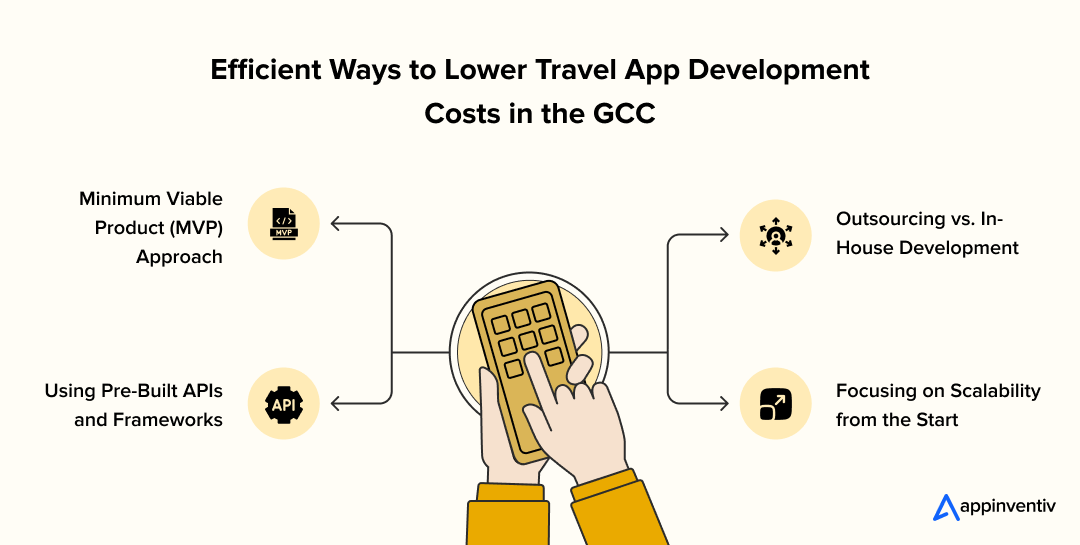
Minimum Viable Product (MVP) Approach
For businesses in the GCC, starting with an MVP is one of the safest ways to test demand without spending big money upfront. Launching with just the most important booking and trip planning features lets companies check if their idea works with local travelers and tweak the app based on what people in the region actually want before putting money into fancy features.
Outsourcing vs. In-House Development
In cities like Dubai or Riyadh, keeping teams in-house gives you tight control but often costs a lot to maintain. Outsourcing app development to local talent hubs can bring costs down while keeping quality up. Many GCC businesses like mixing in-house oversight with outsourced work to balance getting things done well and keeping costs reasonable.
Using Pre-Built APIs and Frameworks
Travel apps in the GCC often need connections with airlines, hotels, payment gateways, and maps. Instead of building everything from scratch, using pre-built APIs helps cut development time and cost. For instance, connecting with regional payment providers or ready-made booking engines makes sure you can launch faster while still meeting what GCC travelers actually need.
Focusing on Scalability from the Start
With tourism growing across the GCC, from Saudi Arabia’s Vision 2030 plans to Dubai’s global tourism push, apps must be built for scale. Creating a scalable backend from the start prevents expensive upgrades later. This way, the app can easily handle seasonal spikes in travel demand without running into costly performance problems.
Build smarter apps by planning your budget wisely
Let our experts help you plan your GCC travel app with transparent costs and no surprises
GCC Travel App Development: Challenges and Practical Solutions
Creating a travel app for the GCC isn’t straightforward. Each country has different rules, currencies, and user preferences. Handle these properly and you’ll build something that actually works well and outperforms competitors.
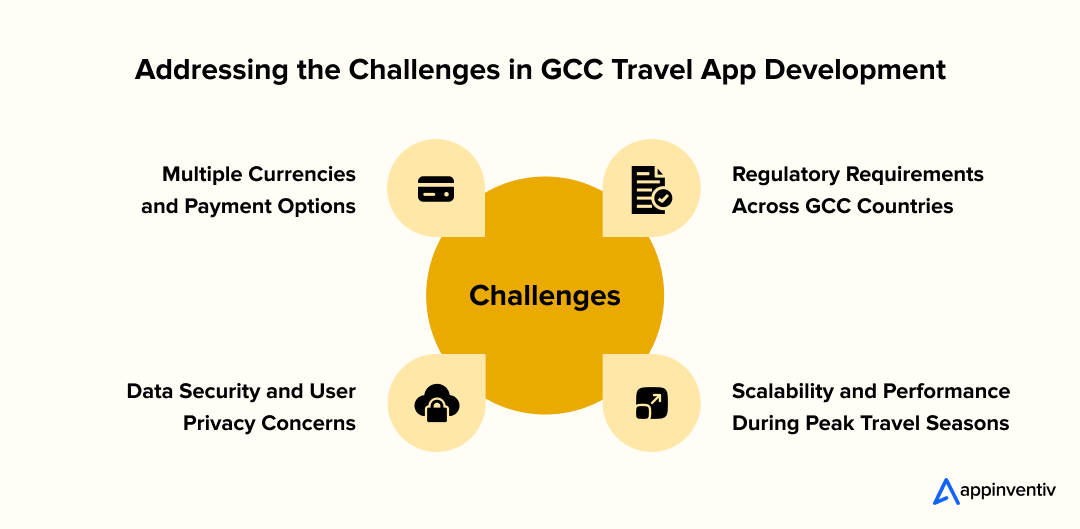
Multiple Currencies and Payment Options
GCC countries use different currencies: AED, SAR, QAR, and KWD. Travelers want transactions that work seamlessly regardless of location or card type.
Solution: Use payment gateways that GCC users trust. Support multiple currencies and local payment preferences. Test each option extensively to prevent checkout failures and booking abandonment. This matters significantly for travel app development in GCC regions.
Regulatory Requirements Across GCC Countries
Each GCC country maintains distinct legal frameworks for travel, data privacy, and payments. Non-compliance results in fines, app restrictions, or reputation damage.
Solution: Work with legal specialists who understand each country’s regulations. Integrate compliance verification during development and monitor regulatory changes. This approach helps effectively satisfy the GDPR and UAE data privacy requirements for apps.
Data Security and User Privacy Concerns
Users provide sensitive details like passports, IDs, and payment information. Keeping this data safe is essential for maintaining trust and preventing security breaches.
Solution: Use encryption, secure API connections, and tight access controls. Follow regional standards plus international best practices. Adding travel app UI/UX RTL support also means sensitive user information gets handled safely within an interface that feels natural to local users.
Scalability and Performance During Peak Travel Seasons
Heavy traffic during holidays or festival periods can overload servers, slow down response times, and impact booking capabilities.
Solution: Create a scalable backend setup with cloud hosting and load balancing. Use real-time monitoring to spot performance issues and improve speed. Companies wanting to build custom travel app for GCC businesses can apply these methods to ensure consistent performance and reliability, especially during busy travel periods.
Create Seamless Travel Experiences in the GCC with Appinventiv
Building a next-generation travel app in the GCC means more than just making a platform for bookings. It’s about giving travelers smooth, personal, and culturally smart experiences. From understanding local payment systems to supporting Arabic travel app UX design (RTL) and making sure you follow regional data rules, every piece matters for success. Companies that thoughtfully mix technology with regional knowledge can pull in more users and build lasting loyalty in a tough market.
As a reputed travel app development company in the GCC, Appinventiv has successfully built top-notch technology-powered travel solutions that showcase its skills in travel app development in the region.
A great example is Empire, a hotel booking app that combines easy navigation, real-time availability, and personal recommendations to enhance the user experience.
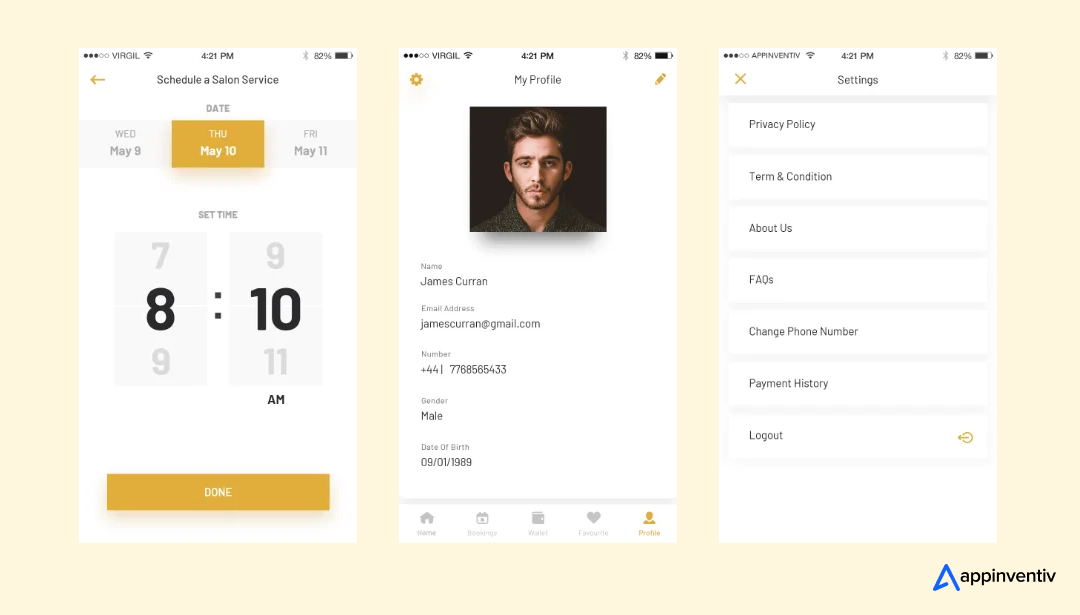
Empire demonstrates how advanced features can be combined with a smooth user experience, meeting the expectations of today’s travelers while addressing region-specific needs.
As travel continues to go digital across the GCC, investing in a strong, scalable, and user-focused travel app is essential. Whether you’re going after business travelers, vacation tourists, or regional users, a well-built platform makes sure things work efficiently, people trust it, and users stay engaged.
Working with an experienced mobile app development company in Dubai, like Appinventiv, can turn your travel app idea into a market-ready solution that creates new standards in the GCC travel ecosystem.
Connect with our experts today to craft your next-gen travel app that entices the GCC region users.
FAQs
Q. How much does it cost to build a custom travel app in Dubai or GCC?
A. The cost to build a travel app in GCC changes depending on features, design, and how much growth you’re planning for. A basic app with booking and trip planning might start around AED 110,000, while advanced apps with AI, AR, and real-time connections can go over AED 1 million. Your total budget also depends on ongoing maintenance and support.
To know more about the entire cost of travel app development in GCC and the proposed timeline for the same, connect with our experts now.
Q. What features should a next-gen travel app in GCC have?
A. Important travel app features for the GCC market include:
- Multi-language support (Arabic, English, and others for expats and tourists)
- Local currency payment options with secure gateways like Mada and PayTabs
- AI-powered trip suggestions tailored to user preferences and travel history
- Integration with hotel and airline APIs for smooth booking
- Real-time updates on flights, hotel availability, and travel alerts
- Personal recommendations to match cultural preferences and regional travel trends
Q. Which travel APIs (flights/hotels) are best for GCC integration?
A. The best APIs for GCC connection are:
- Amadeus – Strong global presence, with extensive flight and hotel inventory
- Sabre – Widely used for airline ticketing and travel distribution
- Travelport – Offers flights, hotels, and car rental APIs
- Local airline APIs (like Emirates, Etihad, Qatar Airways) for direct bookings
- Regional hotel APIs from chains popular in GCC for better localization
- Payment gateway APIs supporting GCC currencies to make transactions simpler
Since API integration affects complexity, it directly influences the cost to build travel app in GCC.
Q. Should I build a native or cross-platform travel app for UAE/GCC?
A. Both approaches have their positive strengths. Native apps give you smoother performance, while cross-platform apps cut down development time and costs. For enterprise travel app development Dubai projects, many businesses go with cross-platform frameworks like Flutter or React Native, since they balance getting things done efficiently, keeping quality high, and reaching people across the region.
Q. How to ensure travel app compliance with UAE & Saudi data privacy rules?
A. Ensuring complete adherence to travel booking app compliance works means following regional data residency laws, using strong encryption, and securing all payment processes. Working with legal and cybersecurity experts during development helps businesses meet UAE and Saudi regulations while keeping user trust intact.
Q. How to build a travel app in GCC?
A. This step-by-step travel app development process is the foundation of how to build a travel app in GCC successfully:
- Market Research: Study GCC traveler preferences and competitors.
- Feature Planning: Focus on basics like multi-language travel apps (Arabic + English), local payments, and bookings.
- UI/UX Design: Create user-friendly, culturally adapted layouts.
- Tech Stack Selection: Pick the best travel app tech stack, featuring Flutter, React Native, or native options, all backed by a robust and scalable backend.
- API Integrations: Add flights, hotels, maps, and GCC payment gateways travel app solutions.
- Testing & Compliance: Make sure security, performance, and following GCC regulations work properly.
- Launch & Scale: Release with an MVP, collect feedback, and expand features.




















